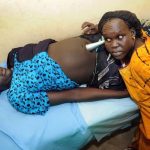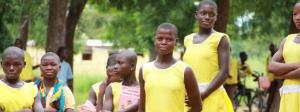Blog Archives
Effort to Empower Mothers and Girls in Ghana
The government of Ghana joined an Advocacy Campaign on Girls’ Education and Maternal Health in Accra, which is the capital and largest city of Ghana. The campaign is part of a United Nations (UN) project aimed at raising the awareness of mothers’ mortality rate during pregnancy and delivery as well as girls’ access to education.
In the first part of the campaign, improving maternal health is one  of the Millennium Development Goals (MDGs), which are eight goals for international development. According to Girmay Haile, who is the United States Agency for International Development (USAID) Country Director, about 3,100 Ghanaian mothers (380 maternal deaths per 100,000 live births) died during pregnancy and childbirth in 2013 due to postpartum haemorrhage, hypertensive disorders, and abortion sepsis (Graphic Online). Although the maternal mortality ratio in Ghana is decreasing annually, it remains a major issue because aforementioned causes of maternal death are preventable. Under the slogan of “No Woman Should Die Giving Life”, the government and organization officials have a plan to train maternal health service providers to facilitate skilled and safer delivery of babies. However, going beyond the role of conveying knowledge, the government, local communities, and external agencies have to consistently improve the healthcare system and expand benefits of medical treatments.
of the Millennium Development Goals (MDGs), which are eight goals for international development. According to Girmay Haile, who is the United States Agency for International Development (USAID) Country Director, about 3,100 Ghanaian mothers (380 maternal deaths per 100,000 live births) died during pregnancy and childbirth in 2013 due to postpartum haemorrhage, hypertensive disorders, and abortion sepsis (Graphic Online). Although the maternal mortality ratio in Ghana is decreasing annually, it remains a major issue because aforementioned causes of maternal death are preventable. Under the slogan of “No Woman Should Die Giving Life”, the government and organization officials have a plan to train maternal health service providers to facilitate skilled and safer delivery of babies. However, going beyond the role of conveying knowledge, the government, local communities, and external agencies have to consistently improve the healthcare system and expand benefits of medical treatments.
 During the second part of the campaign, girls’ education is also included in the MDGs in that their education can promote gender equality. Rushnan Murtaza, who is the Deputy Representative of the United Nations Children’s Fund (UNICEF), focused on enhancement of the transition from primary to secondary education as well as on the increase of access to education (AllAfrica). Under the slogan of “Empowering Girls for a Stronger Ghana,” the government introduces girls to the stories of successful female athletes, organizes girls’ clubs that stress on the topic of teenage pregnancy, and provides girls with sanitary pads against social and physical barriers related to menstrual management. Through these activities, the implementors of the program are looking forward to inspiring girls to enroll and stay in school. The active participation of girls is important for their education. Nevertheless, it remains a challenge to continue girls’ education without the favorable atmosphere of society as a whole.
During the second part of the campaign, girls’ education is also included in the MDGs in that their education can promote gender equality. Rushnan Murtaza, who is the Deputy Representative of the United Nations Children’s Fund (UNICEF), focused on enhancement of the transition from primary to secondary education as well as on the increase of access to education (AllAfrica). Under the slogan of “Empowering Girls for a Stronger Ghana,” the government introduces girls to the stories of successful female athletes, organizes girls’ clubs that stress on the topic of teenage pregnancy, and provides girls with sanitary pads against social and physical barriers related to menstrual management. Through these activities, the implementors of the program are looking forward to inspiring girls to enroll and stay in school. The active participation of girls is important for their education. Nevertheless, it remains a challenge to continue girls’ education without the favorable atmosphere of society as a whole.
The Advocacy Campaign on Girls’ Education and Maternal Health seems to be a pivotal starting point for empowering women of Ghana. However, is the launch of the campaign sufficient enough to counter the ingrained factors that lead to maternal mortality and unsustainable girls’ education? In the initial stage of the project, the contributors and assistants should provide a more specific action guides combined with feasible plans that are suitable within the local context and not focus on immediate results solely for the attainment of the goal. Furthermore, teachers, parents, men, and the whole community should exert effort to support and encourage women altogether.
